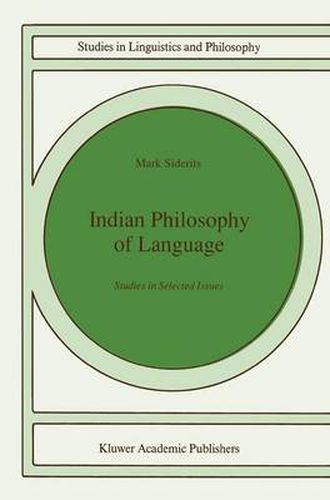Readings Newsletter
Become a Readings Member to make your shopping experience even easier.
Sign in or sign up for free!
You’re not far away from qualifying for FREE standard shipping within Australia
You’ve qualified for FREE standard shipping within Australia
The cart is loading…






This title is printed to order. This book may have been self-published. If so, we cannot guarantee the quality of the content. In the main most books will have gone through the editing process however some may not. We therefore suggest that you be aware of this before ordering this book. If in doubt check either the author or publisher’s details as we are unable to accept any returns unless they are faulty. Please contact us if you have any questions.
This book examines some of the more important theories to be found in classical Indian philosophy that bear directly on current concerns in philosophy of language. The issues discussed are three: the problem of sentential unity, the sense-reference distinction, and our talk about the non-existent. In each case the author presents the views of selected Indian philosophers on the issue – views that differ in significant ways from those that are usually considered in contemporary debates in philosophy of language. The intention throughout is to add the voices of classical Indian theorists to these contemporary debates. Thus Indian approaches to such issues as the relation of word meaning to sentence meaning and the problem of negative existentials are not only explicated but also assessed for their adequacy relative to the approaches of classical and contemporary analytic philosophers of language. No background knowledge of Indian philosophy is presupposed; the book should thus prove of interest to specialists in philosophy of language, semantics, as well as to those working in Indian and comparative philosophy.
$9.00 standard shipping within Australia
FREE standard shipping within Australia for orders over $100.00
Express & International shipping calculated at checkout
This title is printed to order. This book may have been self-published. If so, we cannot guarantee the quality of the content. In the main most books will have gone through the editing process however some may not. We therefore suggest that you be aware of this before ordering this book. If in doubt check either the author or publisher’s details as we are unable to accept any returns unless they are faulty. Please contact us if you have any questions.
This book examines some of the more important theories to be found in classical Indian philosophy that bear directly on current concerns in philosophy of language. The issues discussed are three: the problem of sentential unity, the sense-reference distinction, and our talk about the non-existent. In each case the author presents the views of selected Indian philosophers on the issue – views that differ in significant ways from those that are usually considered in contemporary debates in philosophy of language. The intention throughout is to add the voices of classical Indian theorists to these contemporary debates. Thus Indian approaches to such issues as the relation of word meaning to sentence meaning and the problem of negative existentials are not only explicated but also assessed for their adequacy relative to the approaches of classical and contemporary analytic philosophers of language. No background knowledge of Indian philosophy is presupposed; the book should thus prove of interest to specialists in philosophy of language, semantics, as well as to those working in Indian and comparative philosophy.